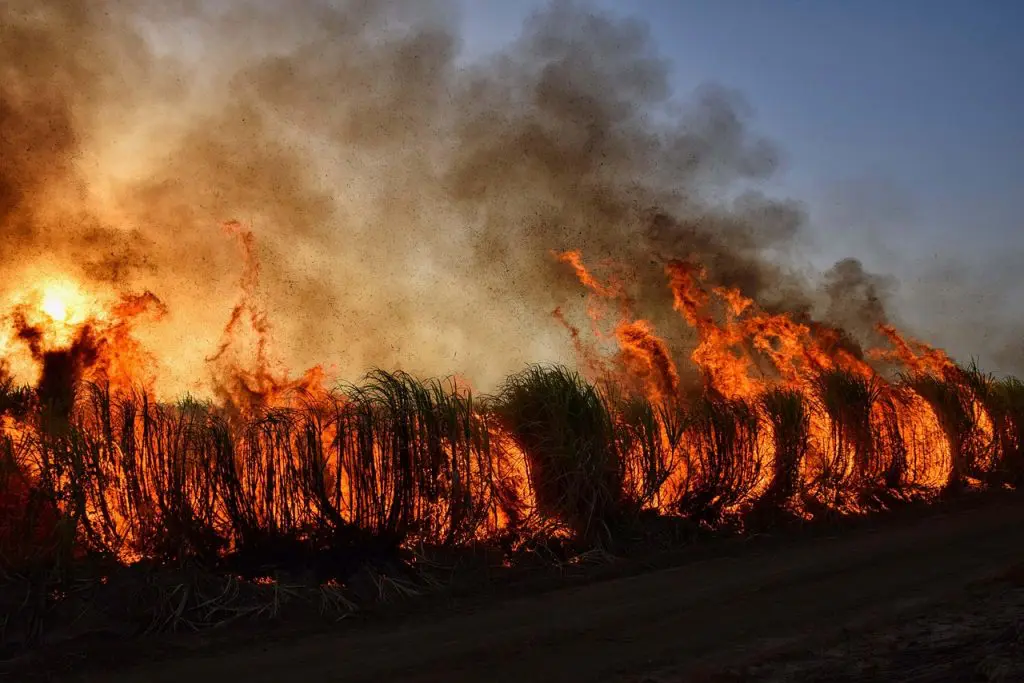
Wildfires in the Mourne Mountains Severely Impact Insect Populations, Study Finds A new ecological study has revealed significant declines in insect populations in the Mourne Mountains following the major 2021 wildfire, highlighting the long-term impact of such events on local biodiversity. Insect Populations Plummet After 2021 Mournes Fire The research was led by ecologists from […]
A new ecological study has revealed significant declines in insect populations in the Mourne Mountains following the major 2021 wildfire, highlighting the long-term impact of such events on local biodiversity.
The research was led by ecologists from RSK Ireland in partnership with the National Trust and focused on Thomas’ Mountain, an area within the Mourne Mountains designated both a Special Area of Conservation (SAC) and an Area of Special Scientific Interest (ASSI).
By comparing invertebrate data from fire-damaged sites to nearby unaffected areas, the study showed a dramatic decrease in insect numbers, with some species declining by up to 90%.
Adam Mantell, senior ecologist at RSK Ireland, said:
‘Our research indicates that the 2021 fire caused severe damage to the heathland and the invertebrate population it supports. […] What we’ve seen is a significant reduction in invertebrate numbers in burned areas. That matters because invertebrates sit low on the food chain, supporting birds, reptiles, amphibians, and mammals.’
Insects play a crucial ecological role, and their decline may cause ripple effects across the wider ecosystem, especially in areas with recurring wildfires.
There are various negative impacts of wildfires on insects:
One of the most immediate consequences of wildfires is habitat destruction. Fires can decimate vast areas of woodland and heathland, which are crucial habitats for many insect species. Research indicates that certain species, particularly those that inhabit the ground or lower vegetation layers, struggle to recover after such catastrophic events.
Insects are vital for pollinating plants and, in turn, plants are essential for sheltering and feeding various insect species. The loss of vegetation due to wildfires alters food sources and breeding grounds, putting additional pressure on already declining insect populations. Studies have shown that regions affected by wildfires see a drastic decrease in species richness and abundance.
Insects have intricate life cycles, often synchronised with the availability of food and suitable habitats. The devastation caused by wildfires disrupts these cycles, affecting reproductive success rates. For instance, species that rely on specific host plants for feeding and breeding may find their food sources obliterated, leading to population declines.
The devastation of insect populations has wider ramifications for the Mourne Mountains’ food chain. Birds and small mammals that rely on insects for nourishment may face food shortages, leading to declines in their populations as well. This cycle of decline can trigger significant variations in ecosystem dynamics, potentially resulting in long-term changes in species composition and abundance.
As pollinators, insects are essential for the reproductive success of many plant species. The reduction in insect populations due to wildfires could lead to decreased plant reproduction, affecting the overall plant diversity in the Mournes. This erosion of pollination services can disrupt not only the habitats of insects but also the animals that rely on those plants for survival.
Although some vegetation may begin to regrow within years of a fire, the study noted that invertebrate recovery is much slower, potentially taking decades—if recovery occurs at all.
Mr Mantell added:
‘Even when vegetation recovers, the invertebrate populations may take far longer to bounce back, if they recover at all.’
The findings point to a broader ecological impact than previously understood, suggesting that insect losses may better reflect the full extent of wildfire damage than vegetation loss alone.
Conducted over three months in summer 2024, this is one of the first studies in Ireland to focus specifically on how wildfires affect insect biodiversity. It comes as fire crews across the UK face rising numbers of wildfire incidents—over 500 recorded so far in 2025, according to the latest warnings.
‘You only had to glance at the news in April or May to see how common wildfires have become,” said Mr Mantell. “Despite that, there’s been a gap in understanding just how long-lasting the damage can be.’
The study highlights the importance of evidence-based conservation planning and the need for better wildlife and land management in vulnerable upland areas like the Mournes.
Melina Quinn, the National Trust’s nature conservation adviser, described the insect population data as ‘invaluable’ in helping conservationists understand the long-term effects of wildfire on natural habitats.
The results arrive amid growing concern over the increasing frequency and severity of wildfires in the UK and Ireland, partly attributed to climate change and changing land-use practices.
The 2021 blaze in the Mournes is still considered one of the most damaging in recent memory, and the newly published data makes clear that its effects are still being felt years later.
This updated study serves as a critical reminder of the long-term consequences of wildfires on biodiversity, especially in protected landscapes. Insects, often overlooked, are vital components of ecosystems, and their recovery should be a key focus in any post-wildfire environmental strategy.
At All-Ireland Sustainability, we’re committed to building a greener, fairer island—together. Stay informed on the latest environmental initiatives, community action, and policy developments shaping sustainability across Ireland, North and South.
👉 Sign up for our newsletter today and be the first to hear about upcoming events, expert insights, and ways to get involved.
Whether you’re a seasoned advocate or just starting your journey, new members are always welcome—your voice matters.
Subscribe now and be part of the All-Ireland Sustainability network.